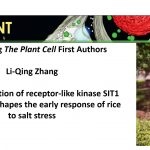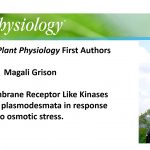Recognizing Plant Physiology first authors: Melanie Morales Fernández
Melanie Morales Fernández, first author of Malondialdehyde: Facts and Artifacts
Current Position: Postdoctoral researcher of the Spanish Government Fellowship ‘Juan de la Cierva’ in the Research Group of Plant Biology under Mediterranean Conditions, Department of Biology, University of Balearic Islands, Spain
Education: MsC of Environmental Agrobiology, PhD Plant Biology
Non-scientific Interests: Nature, travel, sport, photography, and reading
Brief bio: I received my Ph.D. in Plant Biology from University of Barcelona (UB) in 2015 submitting a thesis focused on the study of ageing in long-lived perennial plants (Borderea pyrenaica and Vellozia gigantea), with an emphasis on oxidative stress and vitamin E. Previously, I obtained the BSc in Biology and MSc in Environmental Agrobiology from the University of Barcelona during 2011 and 2012, respectively. During the BSc I collaborated at the Department of Plant Biology (UB) in stress-memory studies using the model plant Arabidopsis. During my early predoctoral research career, I conducted a stay of three months at the Federal University of Minas Gerais (Belo Horizonte, Brazil) within the program of Scientific and Technological Cooperation between Brazil and Spain. In this framework, we performed studies on the biochemistry and physiology of Brazilian palm (Acrocomia aculeata), particularly on fruits and seeds, for its potential use as biofuels. Immediately after being awarded the Ph.D., I remained as a postdoctoral researcher in the ANTIOX research group, in which I started new collaborations (PLANTPOPNET; www.plantpopnet.com) through the integration of physiological and ecological approaches in order to use oxidaive stress markers as a proxies of mortality in plants. After that, in 2017 I started my postdoctoral project as a Principal Investigator funded by FONDECYT (government of Chile, 2017-2019) titled “Oxidative stress as a master regulator in trade-offs between productivity and stress tolerance in terrestrial plants: new model species for studying mechanism of future interest to crops”. During this project I also joined to the international network of NEXER (Network for Extreme Environment Research; www.nexerchile.cl) and participated in several field campaigns to collect plant samples and performed physiological measurements in situ under extreme environments such as the Antarctic Peninsule (King George Island), the Chilean Altiplano at 4500 m.a.s.l. (Natural Monument “Salar de Surire”) and the Atacama Desert, the world’s driest desert. Since I awarded the postdoctoral fellowship “JUAN DE LA CIERVA” I moved to the University of the Balearic Islands in order to continue my postdoctoral research career and consolidate my research line, in which I am currently working to unravel the photoprotection mechanisms and oxidative stress signaling in extremophytes to survive under harsh environments of multiple both abiotic and biotic stresses.




